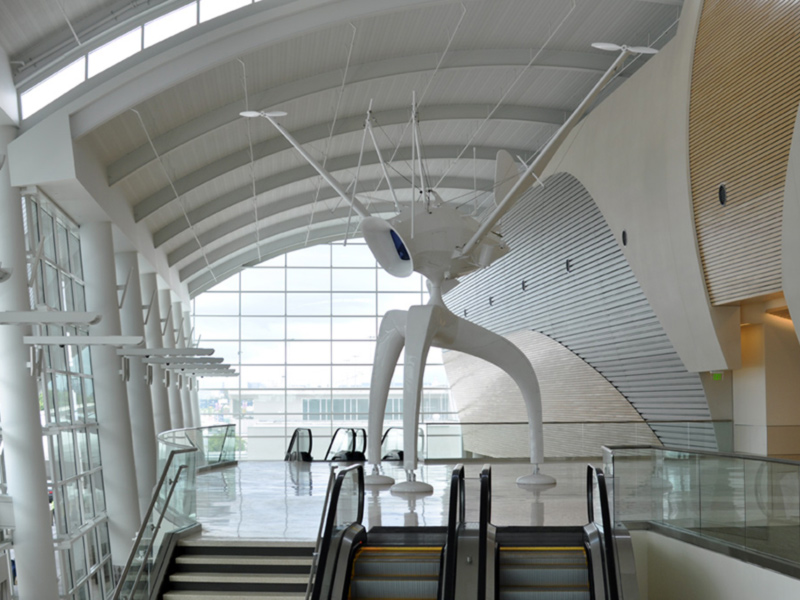Norman Y. Mineta
Our Airport is named in honor of Norman Y. Mineta, former U.S. secretary of transportation; U.S. secretary of commerce; member of Congress; and mayor of San José, California.
As a leading public figure, Mineta was well known for his work in the areas of transportation – including aviation, surface transportation and infrastructure – and national security. He was recognized for his accomplishments in economic development, science and technology policy, foreign and domestic trade, budgetary issues and civil rights.
"Norman Mineta and His Legacy: An American Story" – A Documentary Film Directed by Dianne Fukami
Following Japan’s attack on Pearl Harbor, 1942, when he was 10 years old, Mineta and his family were among the 120,000 Americans of Japanese ancestry forced from their homes and into internment camps by the U.S. government for the duration of World War II.
After returning to his hometown of San José in 1945, Mineta later attended the University of California, Berkeley, where he participated in the Reserve Officers’ Training Corps (ROTC). He graduated in 1953 with a degree in business administration, then went on to serve as a U.S. Army intelligence officer during the Korean War. Mineta then joined his father’s insurance business and undertook a career in public service. In 1967, he became the first Asia Pacific-American member of the San José City Council, becoming the City’s vice mayor in 1968. He was elected mayor of San José in 1971, making him the first Asian American mayor of a major U.S. city.
In 1974, he was elected to the U.S. Congress, where he represented parts of San José and the surrounding region for 20 years.
In Congress, Mineta was an advocate for the burgeoning technology industry in what would become known as Silicon Valley. He worked to encourage new industries and spur job growth and supported the development of infrastructure. He served as the chairman of the U.S. House Committee on Public Works and Transportation from 1992 to 1994, after having chaired the Subcommittee on Aviation and the Subcommittee on Surface Transportation. He was the primary author of the Intermodal Surface Transportation Efficiency Act (ISTEA) of 1991, which shifted decisions on highway and mass-transit planning to state and local governments.
Throughout his time in Congress, Mineta was a constant civil rights advocate. He authored the transportation portion of the Americans with Disabilities Act, aided several reauthorizations of the Voting Rights Act, passionately advocated for the rights of immigrants, coauthored the Disadvantaged Minority Health Improvement Act, coauthored the first bill aimed at eliminating discrimination against gay and lesbian members of the U.S. military and became an early leader in the fight for marriage equality.
He founded and served as the first chairman of the Congressional Asian Pacific American Caucus. He served as the principal author and driving force behind what became the Civil Liberties Act of 1988. This federal act granted redress of $20,000 and a formal presidential apology from President Reagan to every surviving U.S. citizen or legal resident immigrant of Japanese ancestry incarcerated during World War II. Fittingly, Mineta was serving as speaker pro tempore on the day of its passage, and he signed the legislation on behalf of the U.S. House of Representatives.
In 2000, President Bill Clinton appointed Mineta secretary of commerce, making him the first Asian Pacific American Cabinet secretary. In 2001, President George W. Bush appointed Mineta secretary of transportation, where he served until 2006 – one of very few Americans to have served in the Cabinet of presidents from two different parties.
As secretary of transportation on September 11, 2001, Mineta made the unprecedented decision to ground all aviation flights to protect American airspace. He then guided the creation of the Transportation Security Administration, marking the largest mobilization of a new federal agency since World War II.
Outside of his public service roles, Mineta was a vice president of Lockheed Martin, where he oversaw the first successful implementation of the E-ZPass system in New York state. Additionally, he mentored aspiring political leaders and held speaking engagements around the world.
Recognized for his leadership, Mineta received numerous awards, including the Presidential Medal of Freedom – the highest civilian honor in the United States – as well as the Leadership Conference on Civil Rights’ Hubert H. Humphrey Civil and Human Rights Award. He was a recipient of the Wright Brothers Memorial Trophy, which is awarded for significant public service of enduring value to the field of aviation. The George Washington University recognized Mineta with the Dr. Martin Luther King, Jr. Commemorative Medal for outstanding contributions to the field of civil rights. In spring of 2016, Mineta was designated as that year’s Yale Chubb Fellow.
In honor of his service to San José and the nation, the San José City Council officially added Norman Y. Mineta’s name to San José International Airport in November 2001 while Mineta was serving as secretary of transportation.
Secretary Mineta passed away on May 3, 2022, at the age of 90.
On January 25, 2024, in loving memory of Norman Y. Mineta, SJC and Quest Valley Charities unveiled a statue sculpted by Steve Davis. The bronze statue captures Mineta’s essence, featuring a hand placed over his heart to symbolize his patriotism and dedication to the public and serving as a lasting tribute to his legacy. The location for the statue was strategically chosen to ensure maximum visibility in Terminal B, which hosts 70% of the Airport's traffic.
Mineta's contributions to San José and the nation will remain immortalized in this statue, a fitting honor for a man who was not just a son of San José but also a visionary leader and advocate for justice.


